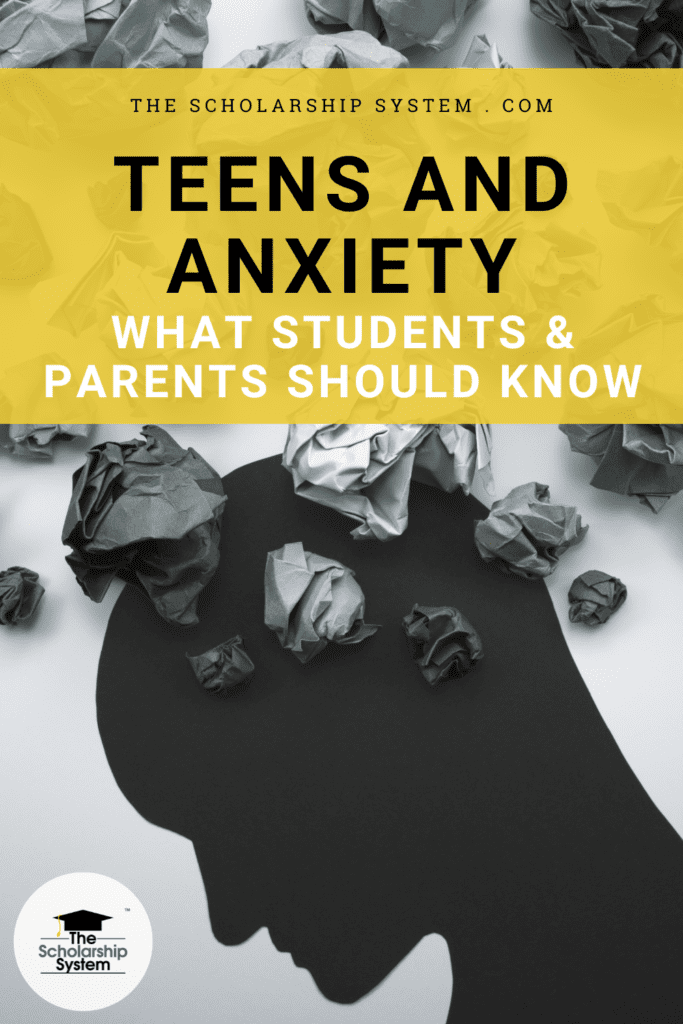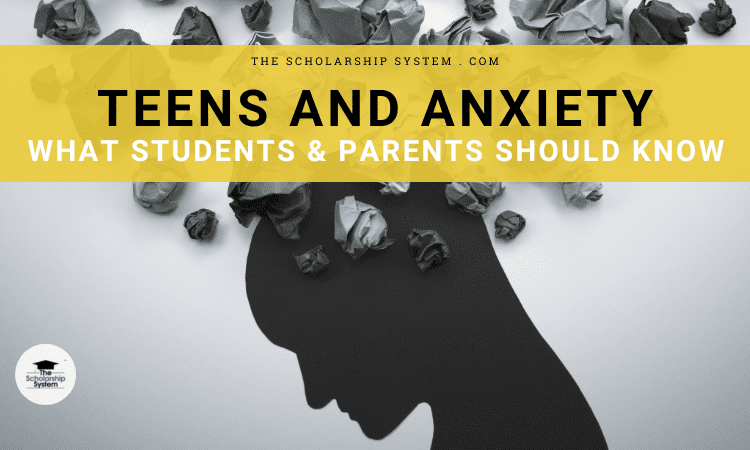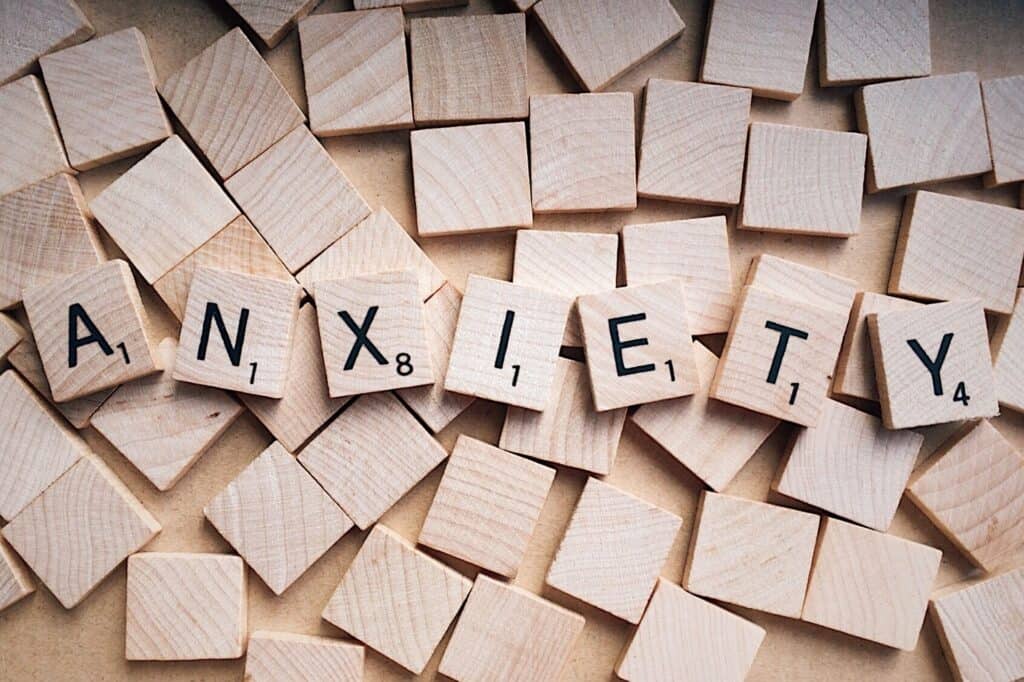Updated on October 24th, 2022
Recently, greater attention has been paid to teens and anxiety. While the occasional moment of anxiety is normal during adolescence, the rate that teens are experiencing disruptive, troubling symptoms for long periods is on the rise.
College costs can affect students’ stress and anxiety. Scholarships can lower those college costs. If you want to learn about how to find and land scholarships, sign up for our free college scholarship webinar! Take a quick trip over to http://thescholarshipsystem.com/freewebinar to reserve a spot today.
Both students and parents often have questions about anxiety. They may wonder how it differs from stress, what the symptoms are, and what they can do to help themselves or their students. If you’re curious about teens and anxiety, here’s a look at what students and parents should know.
Contents
Understanding Teens and Anxiety

Anxiety disorders are incredibly prevalent in the broader population. Often, without proper treatment, anxiety won’t simply disappear on its own. As a result, it’s critical to understand a bit about anxiety, making it easier for students and parents to take the right action.
Anxiety vs Stress: The Difference Between Stress and Anxiety
Many students and parents ask questions like, “Is stress anxiety?” and “Are anxiety and stress the same thing?” There is a difference between stress and anxiety, even though the two conditions can lead to some similar symptoms.
Stress usually occurs when a person is experiencing external pressure, and it typically resolves once the spurring issue is resolved. It results in physical or mental tension in response to a specific trigger, and it’s generally in proportion to the trigger. For example, a student may experience stress before an exam, but those feelings dissipate once the test is complete or after receiving their grade.
Anxiety is more of an internal process. It typically involves persistent worry, fear, doubt, or uncertainty, leading to long-term feelings of dread or apprehension. Anxiety remains even when a spurring incident or core concern is over, and it’s often disproportionate to the situation.
Additionally, it may ignite in situations that don’t represent what many would consider threats or could be based on a hypothetical scenario that isn’t likely to occur. Anxiety can even create additional stressors, creating a compounding cycle.
Overall, stress and anxiety aren’t the same, and the terms shouldn’t be used interchangeably.
How Common Is Anxiety in Teens and College Students?
Anxiety among students isn’t as uncommon as some may assume. The rate of anxiety in adolescence is estimated at 31.9 percent, with 8.3 percent having a “severe impairment.” Anxiety in college students comes out closer to 44 percent when you look at those with moderate to severe symptoms.
Even younger children may experience anxiety. The rate of anxiety in elementary students and middle schoolers (those that have a formal diagnosis) may be near 9.4 percent.
Ultimately, anxiety in high school students and college students is higher than many would expect. While the figures above can refer to short periods where a student was impacted by anxiety, it shows just how prevalent it can be among teens and younger adults.
Causes of Anxiety in College Students and Teens
The causes of anxiety are highly varied. In some cases, there’s a genetic component. Students with a family history of anxiety may be more likely to develop the condition themselves, though that doesn’t mean it’s guaranteed to occur.
In some cases, the presence of other mental health conditions may play a role. For instance, depression and anxiety can co-occur. Phobias are also commonly coupled with situation-specific anxiety. Eating disorders may cause physiological changes that make anxiety more likely, too.
High expectations or persistent pressure to succeed may trigger anxiety in students who feel they’re following short. This can include pressure from a range of sources, including parents, peers, teachers, employers, and family members, or even self-imposed pressures.
Traumatic events can lead to anxiety struggles even if such an event is unlikely to occur again. This can include anything from being involved in an accident, being the victim of a crime, or being targeted by bullies.
A general fear of a possible tragedy – such as being a victim in a school shooting – could lead to anxiety in students who haven’t experienced that specific trauma but are concerned they might.
Some research indicates that social media may spur anxiety. Teens and young adults may compare their lives to the filtered, inaccurate, or even outright dishonest posts they see, causing their self-esteem to fall and leading to worries that their life doesn’t measure up.
However, this only scratches the surface of potential causes. Every student is unique, and how they process information or interpret events and situations varies. As a result, anxiety can occur for other reasons aside from those discussed above.
Anxiety Effects on Students
Anxiety in students can have a vast and lasting impact on their lives. Students with anxiety may struggle in social situations or have trouble handling specific tasks in the classroom, such as taking tests, speaking in front of the class, or participating in group projects. They may have trouble bonding with peers, managing their workload, or absorbing new information.
Students experiencing anxiety may also struggle at home. Their familial relationships could become strained. They might also have trouble handling chores or other household responsibilities.
Often, the impact is based on the nature of their anxiety and the severity of the resulting symptoms. Some students may have highly focused anxiety, only causing symptoms in specific circumstances. Others may experience anxiety more generally, giving it a broader impact on their lives.
Symptoms of Anxiety in Teenagers
As with any health condition, anxiety can produce a variety of symptoms, and it doesn’t manifest the same way in every student. However, some symptoms of anxiety in teenagers are common enough that they can serve as signs of a potential anxiety issue or disorder.
Here is a list of some of the symptoms of anxiety disorders in teens:
- Appetite changes
- Avoiding new or challenging situations
- Classroom disruptions
- Concentration issues
- Difficulty sleeping
- Fainting
- Falling grades
- Fatigue
- Headaches
- Irritability
- Muscle tension
- Nausea
- Panic attacks
- Reassurance-seeking
- Refusing to go to school
- Restlessness
- Sensitivity to criticism
- Sleep disturbances
- Substance use
- Sweating
- Withdrawing from activities
- Worry
In some cases, the nature of the symptoms is indicative of the source of the anxiety. For example, classroom disturbances, refusing to go to school, or avoiding school-related activities or responsibilities could indicate school-related struggles.
However, falling grades and other academic-related challenges may simply be a side effect of broader anxiety or a social problem that affects their school performance. As a result, it’s critical not to jump to conclusions as a parent.
Instead, if your student is exhibiting signs of anxiety, it’s best to coordinate with a mental health professional. They can work with the student to identify causes, develop coping mechanisms, and create an effective treatment or management plan.
Diagnosing an Anxiety Disorder in Teens
Parents and students usually don’t have the knowledge base to formally diagnose whether a student has anxiety. Additionally, if the goal is to secure accommodations at school or treatment that can improve their experience, a parent or self-diagnosis isn’t sufficient.
Only a qualified medical professional can formally diagnose a teen with anxiety. Additionally, they’re able to outline requests to ensure proper accommodations are available and develop treatment plans. As a result, parents should help their students connect with an appropriate physician or mental health professional, allowing them to get an official assessment and get on the path toward a brighter tomorrow.
Managing Anxiety as a Teen: Anxiety Techniques for Students
For students with anxiety, developing strategies for managing the symptoms and preparing for success can be a practical starting point. Whether your student wants to manage performance anxiety at school or challenging feelings in other areas of their life, relaxation techniques are a critical tool. Options like deep breathing, correcting negative self-talk, and visualizing positive outcomes can make a difference.
Additionally, getting proper nutrition and exercise ensures your student maintains their physical selves. Plus, working out can have positive impacts on mood, and if your student chooses an activity they enjoy, it can become a respite from stress.
Finally, and potentially most importantly, students struggling with anxiety should speak with a mental health professional. Mental health professionals can help students determine the source of their anxiety, develop coping mechanisms, and follow an effective treatment plan.
Helping Teens with Anxiety: A Parent’s Guide
Parents are in a unique position when it comes to helping teenagers with anxiety. Along with keeping an eye out for potential symptoms, parents can speak with their students about stressors they’re facing and how they’re feeling. Additionally, they have to ability to ensure their students have time to rest, relax, and recharge.
It’s also wise to encourage positive self-talk and self-compassion. Celebrating your student’s accomplishments with them may also make a difference. Teaching them that it’s okay to ask for help is another critical step for helping students with anxiety in school or other aspects of their lives, as it shows that requesting support is an option.
If you’d like to learn more about how you can help your student specifically, speak with a mental health professional, particularly the one that your student is seeing. They can provide you with targeted tips and guidance that are based on your student’s struggles, making it easier for you to play a positive role in their treatment.
College costs can affect students’ stress and anxiety. Scholarships can lower those college costs. If you want to learn about how to find and land scholarships, sign up for our free college scholarship webinar! Take a quick trip over to http://thescholarshipsystem.com/freewebinar to reserve a spot today.









Leave a Reply